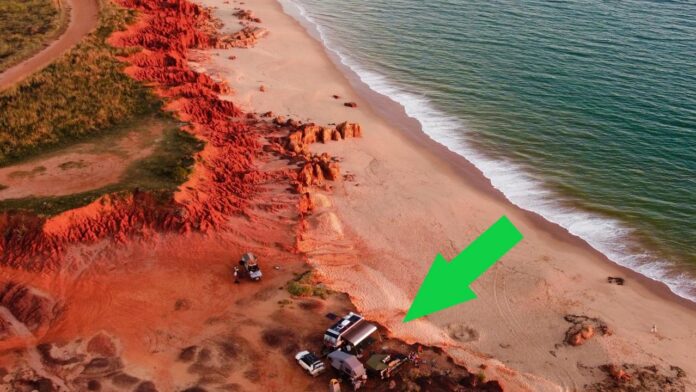[ad_1]
2023 was hands-down the best year of our lives. In January, my husband and I quit our jobs (I’m a journalist, he’s an electrician), bought a camper trailer and set off for a big lap of Australia with our five-year-old twins.
We left Sydney and travelled south to Tasmania and then up the middle of South Australia, before exploring the Northern Territory and finally spending six months travelling down the coast of Western Australia.
We jumped off waterfalls, swam with whale sharks, floated down hot springs, took helicopter rides over gorges in the Kimberley, and camped right on the beach where we lit fires in the sand, ate an embarrassment of freshly caught seafood and swam with turtles and dolphins right off the shore. We truly lived the dream!
I’m sure it all sounds great, but you probably have two burning questions at this point: how much did it cost and how the bloody hell did we afford such an extravagant adventure?
We talked with a lot of families on the road about this, and I can give you the inside scoop.
Firstly, here’s how we did it.
Costs
Average weekly expenses:
– Boring stuff (house, car and health insurance, council rates, phone bills): $400
– Fuel: $500
– Groceries: $400
– Alcohol: $70
– Accommodation (campground fees): $280
– Eating out and takeaway food and coffees: $300
– Experiences (e.g. swimming with whale sharks): $300
– Other (e.g. repairs, fishing tackle, clothing): $250
Total: $2500
These expenses varied widely week-to-week. For example, our first week in Broome cost us $680 in accommodation at the RAC Cable Beach caravan park, and our second week cost us nothing because we were free camping on the Dampier Peninsula.
Weeks spent travelling long distances took a big toll, with diesel costing up to $3.50 a litre in remote places and being guzzled up on the long highways. Meanwhile when we stopped for a week, the fuel bill was blissfully zero.
The other big cost before we left was obviously our camper trailer. We didn’t do what most families on the road do and buy a caravan, because we didn’t want to also have to upgrade our car (a Toyota Prado) due to towing capacity.
So we went with one of the best off-road Australian-made camper trailers instead – a Cub Drifter, at a cost of about $65,000. It meant we could go to more remote places on rougher roads, but we didn’t have the luxury of an internal bathroom or inside kitchen.
How we paid for it
As much as I manifested it, unfortunately we didn’t win the lottery. So in short, we extended our mortgage, rented our house on AirBnb before we left, and then rented it long-term while we were away.
Plus, we sold my car and anything else we could find of value that we didn’t need anymore (goodbye to our OzTent RV5 and most of my designer dresses).
We left with $40,000 in savings and $100,000 borrowed from the bank, plus $900 a week in rent from our house.
We returned with … not much money, and a lot of incredible memories.
How everyone else is doing it
It’s fair to say that most of the families we met on the road were privileged, like us, to own their own homes. And those families are split into two camps: Those who have rented out their houses to fund part of their trip, and those who have sold up everything and have the cash in the bank and no set place to end their trips.
We did meet some young people, mostly in rooftop tents, who were doing a big lap. And they, as well as some families we met, were funding their trips by doing occasional work on the road. Tradies were picking up jobs easily, as were nurses and people working in the mines. There were other people who used their long service leave to fund their travels.
We found most families we spoke to managed to stick to a tighter budget that we did. Some, who had spent longer away, were spending just $1100 to $1500 a week. A lot of families stayed mostly in free camps, some had given up alcohol, and others very rarely ate out.
Everyone was living the dream a bit differently, but they were all making it happen.
Our bank account looks pretty sad at the moment, but we have absolutely no regrets. It’s the best thing we’ve ever done and I don’t know if we’ll ever have a year quite like it.
Hannah Stenning is a freelance writer.
[ad_2]
Source link


